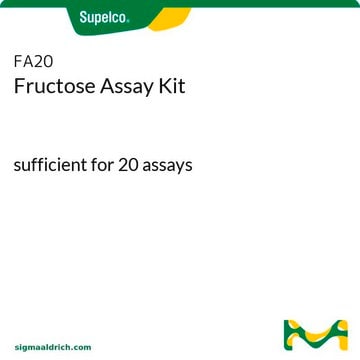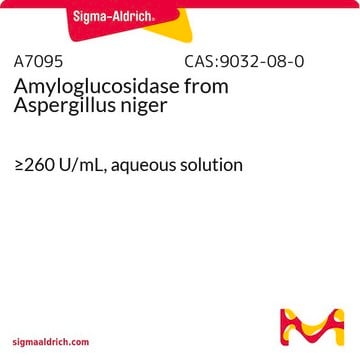G4166
Glucose Isomerase from Streptomyces murinus
≥350 U/g
Synonym(e):
Sweetzyme® IT Extra, D-xylose ketol-isomerase
Anmeldenzur Ansicht organisationsspezifischer und vertraglich vereinbarter Preise
Alle Fotos(1)
About This Item
Empfohlene Produkte
Biologische Quelle
Streptomyces sp. (S. murinus)
Form
powder
Spezifische Aktivität
≥350 U/g
Lagertemp.
2-8°C
Allgemeine Beschreibung
Immobilized glucose isomerase produced from a selected strain of Streptomyces murinus.
Anwendung
Glucose Isomerase from Streptomyces murinus has been used to isomerize xylose to xylulose during the production of dihydrogen from Xylose. It has also been used in the synthetic enzymatic pathway for dihydrogen production from sucrose, to catalyze isomerization of glucose to fructose.
Immobilized glucose isomerase produced from Streptomyces murinus was used for the isomerization of xylose. Glucose isomerase is used in the food industry to produce high-fructose corn syrup.
Biochem./physiol. Wirkung
Few anaerobic bacteria, fungi and plants express an intracellular metalloenzyme called D-xylose isomerase (XI). Most bacteria use the enzyme D-xylose isomerase to transform D-xylose to D-xylulose. D-Xylose isomerase (XI) converts the aldo-sugars xylose and glucose to their keto analogs xylulose and fructose.
Glucose isomerase has wide variety of industrial applications such as producing high-fructose corn syrup (HFCS) and production of ethanol from hemicelluloses. In addition, it also facilitates the study of structure-function relationships by advanced biochemical and genetic engineering techniques.
Physikalische Eigenschaften
0.33 g yields an approximate bed volume of 1ml
Einheitendefinition
one unit converts glucose to fructose at an initial rate of 1 μmole per min at standard analytical conditions
Rechtliche Hinweise
Ein Produkt der Novozyme Corp.
Sweetzyme is a registered trademark of Novozymes Corp.
Lagerklassenschlüssel
11 - Combustible Solids
WGK
WGK 3
Flammpunkt (°F)
Not applicable
Flammpunkt (°C)
Not applicable
Persönliche Schutzausrüstung
Eyeshields, Gloves, type N95 (US)
Analysenzertifikate (COA)
Suchen Sie nach Analysenzertifikate (COA), indem Sie die Lot-/Chargennummer des Produkts eingeben. Lot- und Chargennummern sind auf dem Produktetikett hinter den Wörtern ‘Lot’ oder ‘Batch’ (Lot oder Charge) zu finden.
Besitzen Sie dieses Produkt bereits?
In der Dokumentenbibliothek finden Sie die Dokumentation zu den Produkten, die Sie kürzlich erworben haben.
Kunden haben sich ebenfalls angesehen
Leonardo de Figueiredo Vilela et al.
Bioresource technology, 128, 792-796 (2012-11-29)
This study presents results regarding the successful cloning of the bacterial xylose isomerase gene (xylA) of Burkholderia cenocepacia and its functional expression in Saccharomyces cerevisiae. The recombinant yeast showed to be competent to efficiently produce ethanol from both glucose and
Kripa Rao et al.
Applied biochemistry and biotechnology, 146(1-3), 101-117 (2008-04-19)
Of the sugars recovered from lignocellulose, D-glucose can be readily converted into ethanol by baker's or brewer's yeast (Saccharomyces cerevisiae). However, xylose that is obtained by the hydrolysis of the hemicellulosic portion is not fermentable by the same species of
Dominik Oberthuer et al.
PloS one, 7(6), e33545-e33545 (2012-06-08)
In this paper, we demonstrate the feasibility of using in situ Dynamic Light Scattering (DLS) to monitor counter-diffusion crystallization experiments in capillaries. Firstly, we have validated the quality of the DLS signal in thin capillaries, which is comparable to that
Molecular and industrial aspects of glucose isomerase.
Bhosale SH,et al.
Microbiology and Molecular Biology Reviews, 60(2), 280-300 (1996)
High-yield production of dihydrogen from xylose by using a synthetic enzyme cascade in a cell-free system
Martin DC, et al.
Angewandte Chemie (International Edition in English), 52(17), 4587-4590 (2013)
Unser Team von Wissenschaftlern verfügt über Erfahrung in allen Forschungsbereichen einschließlich Life Science, Materialwissenschaften, chemischer Synthese, Chromatographie, Analytik und vielen mehr..
Setzen Sie sich mit dem technischen Dienst in Verbindung.











